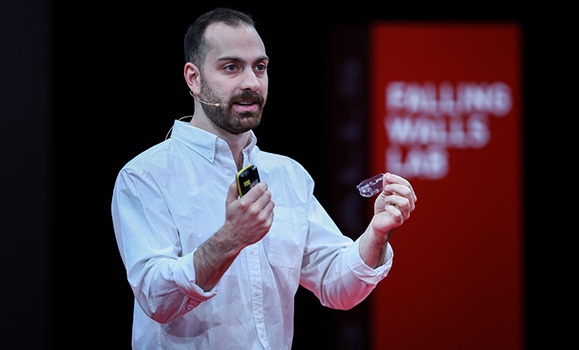Joseph Bedard holds up a piece of plastic towards the curious crowd.Ā
Like most in the audience, you might assume this sliver of material was created with petrochemicals ā a critical component in 85 per cent of all plastics around the globe. But this is no ordinary piece of plastic. It was constructed using one of the building blocks of air, nitrogen, along with some phosphorus for good measure.Ā
Bedard, a PhD candidate in the Department of Chemistry, won top prize in the Falling Walls Lab Pitches competition in Berlin, Germany last week for his presentation on the science of how thatās possible. You can view his award-winning presentation, āBreaking the Wall of Alternative Plastics,ā at the bottom of this article.
Fellow Dalhousie PhD student, Jamil Muradov, also presented at the competition last week. He placed first in the Dalhousie hosted-regional finals for his presentation, āBreaking the Wall of Concussion Complications.āĀ Dal-linked also participated in the Falling Walls summit last week as part of the Engage pitch competition that aims to identify the best science engagement programs in the world each year.
We caught up with Bedard shortly after his win in Berlin.
Your research focuses on creating carbon-free plastics. Why is this important?
Right now, around 85 per cent of all plastics are made from petrochemicals, which are chemicals or reagents acquired during fossil-fuel extraction and refining. There is a necessary push to divest from fossil fuels to live in a sustainable society, but if we stopped extracting and refining them today, we'd lose the building blocks all for those crucial synthetic materials. In order to transition away from fossil fuels fully, we need to not just solve a sustainable energy problem, but also a sustainable materials problem.Ā
What is unique about the approach you and your lab have devised?
Our approach is inspired by nature. Plants extract CO2 molecules from the air and use it to grow. Essentially, these trees are converting air into a material. Our approach takes the most abundant resource in the air, nitrogen, and uses it as a building block for synthetic plastics. Typically, nitrogen is explosive when condensed into materials, but weāve found a way to employ phosphorus reagents to stabilize a high density of nitrogen into plastic materials.Ā
Why do you think your pitch was so successful at Falling Walls?
First, massive credit is due to my supervisor, Dr. Saurabh Chitnis, and the office of the VPRI, Dr. Alice Aiken, who have been very supportive. I think what made my pitch stand out from the other 100 extremely high caliber pitches was the way the pitch captured the imagination of the audience. The idea itself is also something that is emblematic of the Falling Walls ethos: really revolutionary, outside-the-box ideas can change the world for the better. Lastly, I tried to leverage my strengths during the pitch: Iām quite passionate about this science, and I like to laugh and have fun, so l tried to let both aspects of myself shine through.Ā
What does winning the Falling Walls competition mean to you and your research going forward?
On a personal level, Iāve made friends and connections that I imagine will carry through my entire life. Some staggeringly talented people present in this competition, and I've been truly fortunate to get to know them. I'll never forget this experience. Winning at this competition has given my research a kind of visibility that is unparalleled to anything I've experienced before. Some pretty serious people have been approaching me with a lot of excitement and enthusiasm about this idea, and I'm looking to keep the train rolling.

